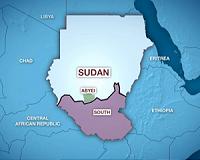| . |  |
. |
Mogadishu, Somalia (UPI) May 25, 2011 The seemingly endless war in Somalia sometimes appears to be quite surreal, an echo of Evelyn Waugh's famous novel "Scoop" on the vagaries of the Abyssinian war of the 1930s between Emperor Haile Selassie and Mussolini's invading army. The shaky Western-backed Transitional Federal Government and African Union peacekeepers are pushing back Islamist insurgents in Somalia's capital, albeit in fits and starts. But the TFG, set up in 2006 with the support of the Ethiopian regime, successors to Selassie's long-dead monarchy, is so riddled with corruption and power struggles that it may collapse just as it's getting the upper hand against the Islamists for the first time in five years. Indeed, infighting between the president, Sheik Sharif Sheik Ahmed, and the Speaker of Parliament Sharif Hassan Sheik Aden, is doing more to threaten the TFG's first real military success than the Islamist insurgents themselves. "People are losing faith because they're hoping that the government will do its work, but the country's leaders are fighting each other and not trying to come together to address their differences," lamented Deputy Speaker Muhammed Omar Dalha. According to the Jamestown Foundation, a Washington think tank that monitors global security issues, "In-fighting between senior leaders has been common during the last two decades of violence but it is now threatening the government's military operations against the Islamist insurgents." Fortunately for the TFG, the Islamists are also riven by political and clan rivalries that have weakened their military capabilities. With the RFG's mandate expiring Aug. 20, Somalia's bickering political leaders led by the president voted March 28 to give themselves a one-year extension rather than face elections or come up with a constitution as they have been tasked to do by their international partners. They insist they need more time to solve Somalia's problems and establish basic services in a country that's been gripped by anarchy for the last two decades. Somalia's international backers, led by the United States, are pressing for new parliamentary elections in hopes a new legislature will get things moving. But on Feb. 3, lawmakers unilaterally voted themselves a three-year extension. All these officials, like their Islamist adversaries, al-Shabaab, who have pledged allegiance to al-Qaida, are reluctant to give up lucrative rackets, like skimming aid and humanitarian projects worth $1 billion a year. These positions come with access to lots of money and perks, all courtesy of foreign aid in a land where the democratic process is an outlandish concept. Much of the aid money is stolen or diverted by one side or the other, often financing a conflict that shows no real sign of ending. As often as not, weapons and ammunition provided by the Americans or others for TFG forces are sold off -- sometimes to al-Shabaab -- by corrupt commanders who pocket the proceeds. Somalia hasn't had a functioning government since clan warlords ousted dictator Mohammed Siad Barre in 1991. In the meantime, a new dispute has broken out between the president and the Parliament speaker over a presidential election. The speaker, backed by the United States and other foreign backers of the TFG, insists polling be conducted on schedule this summer, along with parliamentary elections. The TFG launched its long-delayed -- and much talked of -- offensive Feb. 23. Initially, it made some sizeable gains in Mogadishu and in central and southern Somalia. Much of the fighting was done by an 8,000-strong African Union peacekeeping force, known as Amisom, which has considerable firepower and artillery and some semblance of military discipline. Government troops, many of them recently trained in Kenya under U.S.-funded programs, total 9,000 men. But this ragtag force, grandly known as the Somalia National Army, is poorly led and badly equipped. Still, they helped retake several districts of Mogadishu, around half of the city, greatly expanding the tiny enclave around the seaport and airport where the TFG had held on by its fingernails for the last couple of years. "If it wasn't for Amisom and the Ethiopians, the TFG would be in bad shape," a Western observer commented. Ethiopia, a U.S. ally, has provided armor and artillery support for TFG forces along part of its border abutting western Somalia and in the south along the Kenya border.
Share This Article With Planet Earth
Related Links Africa News - Resources, Health, Food
 Sudan slides toward another civil war
Sudan slides toward another civil warJuba, Sudan (UPI) May 24, 2011 Six years after it ended a devastating 20-year civil war, Sudan appears to be sliding toward a new conflict between the Arab-dominated north and the Christian-animist south, which voted overwhelmingly to secede in a historic January referendum. The flash point is the disputed border region of Abyei, a key oil-producing zone that's vital to both sides. Hundreds of people, many of ... read more |
|
| The content herein, unless otherwise known to be public domain, are Copyright 1995-2010 - SpaceDaily. AFP and UPI Wire Stories are copyright Agence France-Presse and United Press International. ESA Portal Reports are copyright European Space Agency. All NASA sourced material is public domain. Additional copyrights may apply in whole or part to other bona fide parties. Advertising does not imply endorsement,agreement or approval of any opinions, statements or information provided by SpaceDaily on any Web page published or hosted by SpaceDaily. Privacy Statement |